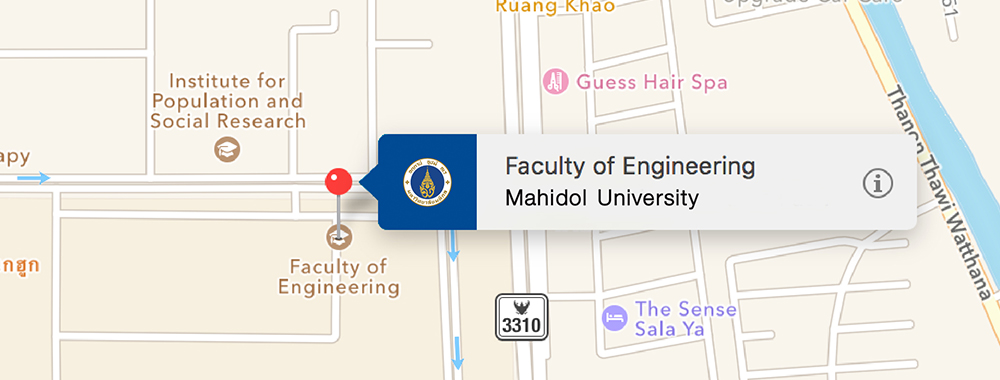Computer Engineering
With the primary purpose of industrialization and internationalization, CO focuses on five areas: (1) Hardware and Circuit Design, (2) Software Engineering, (3) Network Engineering, (4) Applied IndustrialApplications, and (5) Digital Forensics. The Department emphasizes the integration of self-learning technology and the development of electronic courses through network infrastructure. Students are encouraged to obtain industrial experience and participate in computer-related activities, providing technological information and services to the public, for example.
Programs
- Computer Engineering
PEO 1: Graduates lead or participate in the design and development of computer networks hardware and software, embedded systems, for various applications. Graduates also apply knowledge and skills to solve advanced computer-related engineering problems.
PEO 2: Graduates combine communication and leadership skills to become productive members of interdisciplinary teams and they do so ethically and professionally.
PEO 3: Graduates pursue advanced education and engage in lifelong learning to be well adapted to rapidly changing digital technologies and demanding applications.PEO 1: Technical Skills: EGCO graduates take part in design and development of computerized products in technical areas, including computer networking design, hardware and software development, and applications on embedded system or other complex digital system.
PEO 2: Professional Skills: EGCO graduates are in positions of leaderships and able to apply knowledge and skills to solve advanced engineering problems, or pursue higher education.
PEO 3: Interpersonal Skills: EGCO graduates are capable of integrating communication skills with technical skills, thus enable them to be productive members of interdisciplinary teams.
PEO 4: Life-long learning: EGCO graduates utilize their background knowledge and technical skills to engage in lifelong learning; well adapted to current situation and rapidly changing society with ethical responsibility.The student outcomes for the Computer Engineering Program are listed below. Graduates of the Computer Engineering Program will have attained the following outcomes by the time of graduation. They are also found at: https://www.eg.mahidol.ac.th/dept/egco/
SO 1: An ability to identify, formulate, and solve complex engineering problems by applying principles of engineering, science, and mathematics.
SO 2: An ability to apply engineering design to produce solutions that meet specified needs with consideration of public health, safety, and welfare, as well as global, cultural, social, environmental, and economic factors.
SO 3: An ability to communicate effectively with a range of audiences.
SO 4: An ability to recognize ethical and professional responsibilities in engineering situations and make informed judgments, which must consider the impact of engineering solutions in global, economic, environmental, and societal contexts.
SO 5: An ability to function effectively on a team whose members together provide leadership, create a collaborative and inclusive environment, establish goals, plan tasks, and meet objectives.
SO 6: An ability to develop and conduct appropriate experimentation, analyze and interpret data, and use engineering judgment to draw conclusions.
SO 7: An ability to acquire and apply new knowledge as needed, using appropriate learning strategies.Student Enrollment
Student Graduation*
Academic Year
No of student
Academic Year
No of student
% Graduation
2013
39
2016
30
76.92
2014
40
2017
34
85.00
2015
36
2018
32
88.89
2016
37
2019
32
86.49
2017
42
2020
35
83.33
2018
40
2021
39 (Expected)
97.50
Remark: *Drop out mostly from freshman students due to changing of area of interest.
- Computer Engineering (Intenational)
1. Graduates lead or participate in the design and development of computer networks hardware and software, embedded systems, for various applications. Graduates also apply knowledge and skills to solve advanced computer-related engineering problems.
2. Graduates combine communication and leadership skills to become productive members of interdisciplinary teams and they do so ethically and professionally.
3. Graduates pursue advanced education and engage in lifelong learning to be well adapted to rapidly changing digital technologies and demanding applications.The student outcomes for the Computer Engineering Program are listed below. Graduates of the Computer Engineering Program will have attained the following outcomes by the time of graduation.
1. An ability to identify, formulate, and solve complex engineering problems by applying principles of engineering, science, and mathematics.
2. An ability to apply engineering design to produce solutions that meet specified needs with consideration of public health, safety, and welfare, as well as global, cultural, social, environmental, and economic factors.
3. An ability to communicate effectively with a range of audiences.
4. An ability to recognize ethical and professional responsibilities in engineering situations and make informed judgments, which must consider the impact of engineering solutions in global, economic, environmental, and societal contexts.
5. An ability to function effectively on a team whose members together provide leadership, create a collaborative and inclusive environment, establish goals, plan tasks, and meet objectives.
6. An ability to develop and conduct appropriate experimentation, analyze and interpret data, and use engineering judgment to draw conclusions.
7. An ability to acquire and apply new knowledge as needed, using appropriate learning strategies.



